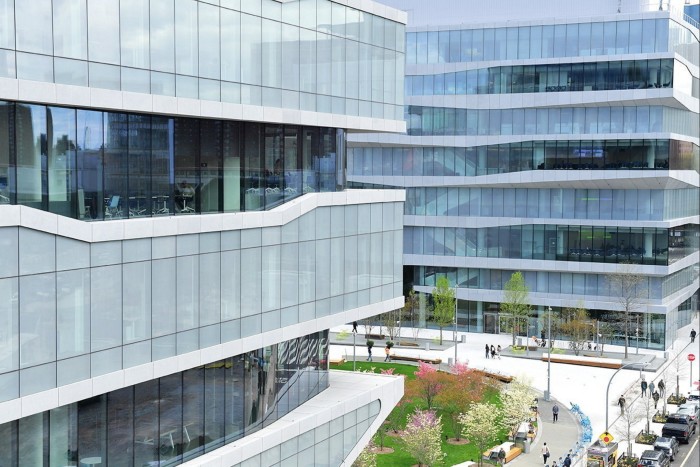Making MBA funding add up in tough times

Roula Khalaf, Editor of the FT, selects her favourite stories in this weekly newsletter.
Completing an MBA had long been a life goal for Cheryl, an executive in her mid 20s working in tech in New York. “It was talked about a lot in my family because my mom had worked with a lot of MBAs and she hadn’t got one, but she saw how it had helped others,” she says.
But inflation and the economic outlook have framed her choices of where to study. She has an offer from NYU Stern School of Business with a full-tuition scholarship but is instead taking up an offer from another highly ranked MBA college outside New York because it is offering to pay a large part of her living expenses during the two years of full-time study. “Cheryl” asked for her real name not to be used because she is also worried about job cuts at her employer, which she has yet to tell about her plans for this year.
“Living in New York is too expensive, and I am haemorrhaging money as it is,” she says. “At [the other school] I would get to do this without the money worries.”
Such stories may be surprising given the stereotype of MBA students coming from a privileged elite, particularly at the top schools. But deans and admissions officers say there has been a significant rise in MBA applicants asking about financial support for 2022-23 and 2023-24.
Global MBA Ranking 2023

View the MBA ranking and report. Register for the February 22 Spotlight on MBA online event, and the MBA 101 guide to getting into business school
Some students are even rejecting offers because they can no longer meet the costs from savings or debt. The fees for full-time MBAs vary greatly. For instance, the one-year course at the UK’s University of Cumbria, starting in September, costs £11,700 ($14,214), while the first year alone of the two-year MBA at Stanford Graduate School of Business is $76,950.
“MBAs are a broad category,” says Robert MacIntosh, chair of the UK’s Chartered Association of Business Schools and pro vice-chancellor of the faculty of business and law at Northumbria University in the UK.
“At the premier league of business schools, you have a lot of wealthy individuals who can afford the costs,” he adds. “But you also have a lot of other people, including social entrepreneurs and public sector workers, who are likely to be struggling to find the money, and might now defer that choice until the economy is looking better.”
Stephanie Kluth, director of admissions at ESMT Berlin, says there has been a marked rise in financial stress among students. “It comes through most clearly in their desperation to find decent, affordable housing — a problem that is clearly tied to inflation,” she says.
Applications for the full-time course starting in September 2022 at Vlerick Business School in Belgium were down 11 per cent, with cost of living a key factor for many who withdrew from the process, according to Yolanda Habets, head of Vlerick’s full-time MBA.
“Students start planning for their MBA two or three years in advance of making an application so, if six months before you are due to start you find you have not saved enough money, that is a real issue,” Habets says. “That was the case for a lot of these students.” Vlerick has reacted by offering financial advice to the current MBA intake.
For Jai Singh, a 28-year-old consultant working at Deloitte in Washington, an MBA has been a longstanding goal. He sees the cost as an investment in his leadership skills rather than a cost-effective way to achieve a promotion or a career pivot — the aim of many students.
“There are so many exit and growth opportunities in consulting at the moment that I believe an MBA isn’t required to pursue a new job or grow in a consultancy,” Singh says. “However . . . I have noticed the leaders with MBAs are the ones that are most able to pivot and respond to disruption in their industry or non-traditional business problems. A large part of why I want to get an MBA is because I think it will help me be the best leader I can be”.
Singh, who is considering business school offers, is concerned about how to fund his studies given the recent hikes in US interest rates, affecting both cost of living and student debt. “One of the changes I decided to make to help afford my MBA was to spend some time living at home with my parents,” he says. This has helped him save money.
At Warwick Business School in England, where there are about seven applications for every place and about 30 different nationalities on the full-time MBA, funding is seldom a deal breaker for successful applicants because they often have considerable family support.
But John Colley, Warwick’s associate dean of post-experience masters programmes, expects to see a rise in requests for scholarships and senses that his team will have to compete with other schools on financial support to retain the best students. “When people become more hard-pressed for money, they start shopping around more for scholarships,” he says.
It is not only students who are hit by the rising cost of living, Colley says. “Schools often commit to fees a couple of years ahead of them starting so, if our costs rocket internally, we cannot pass that on.”
The likely impact of recession in several key markets in the US and Europe in 2023 may affect demand. A rise in unemployment could push people into applying for a full-time course, even if the cost has increased because of inflation, admissions advisers say.
Caroline Diarte Edwards, co-founder and principal at Fortuna Admissions and former director of admissions at Insead in France, says: “We are seeing an increase now in candidates interested in pursuing an MBA, even compared to a couple months ago, due to the weakening of the job market and recent waves of lay-offs in tech. This has been the trend in other economic downturns.
“While short-term economic factors do influence decision making, we always encourage candidates to take a long-term view of the impact an MBA will have on their career, and the return on investment over time.
“Studies consistently show that an MBA from one of the top schools commands a strong ROI [return on investment] regardless of the economic climate when the student undertakes the programme.”
This article has been amended since publication.
Comments